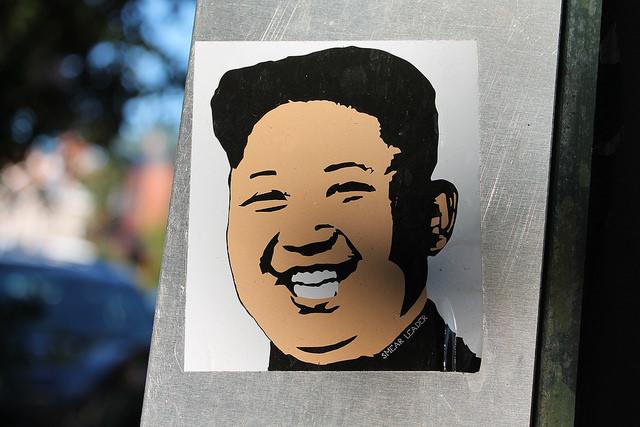The DPRK and a nuclear no-first-use policy
Posted By Tom Murphy on July 22, 2016 @ 12:30

July has been a busy month for North Korean diplomats, with another round of US sanctions [1], and confirmation that South Korea will deploy US THAAD anti-missile systems [2]. The recent North Korean 7th Workers’ Party Congress suggests that this more proactive approach isolating the DPRK both strategically and diplomatically might actually be causing a shift in Pyongyang’s foreign policy.
The Party Congress—the first in 36 years [3]—saw Kim Jong-un elevated from ‘First Secretary’ to ‘Chairman’ of the Supreme Workers’ Party of Korea, following a tradition established at the 1980 Congress where Kim Jong-Il was announced as his father’s successor. The Congress also reviewed the policy direction of the North since 1980, setting the country’s official direction for the foreseeable future.
The generally mundane [4] outcomes from the Congress means we may have to wait another three decades for fresh policy thinking. However Kim’s comments [5] give us some interesting insights into the North’s planned foreign policies.
The Congress suggested a turning point with Kim’s claim that, ‘As a responsible nuclear weapons state, the DPRK will not use a nuclear weapon first unless its sovereignty is encroached upon by hostile aggression forces with nukes’.
Is that a declaration of a nuclear no-first-use policy?
Whatever it is, the North has taken a page from the playbooks of China and the US respectively; it emphasises ‘encroachment of sovereignty’ as a security issue, but is ambiguous about what that actually means. So what would this mean for the region?
For the US: nothing much. The US is a nuclear weapons power, so the considerable uncertainty surrounding Kim’s ‘encroachment of sovereignty’ terminology means that nuclear attack is still on the table.
The DPRK has, however, undermined its ability to threaten pre-emptive nuclear war in retaliation to US–ROK training exercises [6].
For South Korea: in the case of an inter-Korean conflict, it looks like the DPRK has committed to not use nuclear weapons. However Kim’s statement is unclear as to whether nukes would be used on US forces in South Korea. Further, while it’s nice to know one’s country won’t be explosively irradiated, the statement does little to reassure those living in Seoul—a city that lies within range of a plethora of the DPRK’s non-nuclear destructive devices.
But why would the North take this stance, and why now?
Under Kim Jong-Il’s regime, a well-recognised [7] formula was to aggravate tensions in the region through threats, nuclear testing and missile testing. Then it would commit to behaving itself in return for financial or resource aid and diplomatic concessions. Rinse and repeat.
Well-known examples are the payment of US$500 million [8] from the South to the North to host an inter-Korean summit, or the demolition [9] of the Yongbyon nuclear facilities’ cooling tower in return for sanctions and energy concessions (it appears that testing has now resumed [10]).
However the aggravation–concession cycle has been broken. South Korea’s election of hard-line President Park Geun-Hye in 2013, days after a DPRK nuclear test [11], brought a no-nonsense approach to inter-Korean relations. Park is sick of losing the same game. She doesn’t trust the North, and US policy is in tandem, especially since the failed food-aid deal of 2012 [12].
Instead, South Korea and the US are changing the rules. They’ve achieved UN sanctions supported by the DPRK’s long-time ally China. The US has also imposed more than one round of its own sanctions.
Further, South Korea and the US have flat-out refused to engage with Northern offers of action-for-action engagement. Last year, the US declined [13] a DPRK offer to suspend nuclear testing in return for the cancellation of US–ROK military exercises. Earlier this year, South Korea rejected North Korea’s offer [14] for an inter-Korean summit. Last month, President Park ramped up a diplomatic offensive, campaigning overseas to disrupt the DPRK’s relationships with African nations [15] and Iran [16].
That change hasn’t been well-received. The North has ramped up its aggressive overtures, to no avail. In fact, Seoul has responded to Pyongyang’s bad behaviour by restarting counter-propaganda broadcasts [17] and abandoning [18] the jointly-run Kaesong Industrial Complex.
Diplomatic and strategic isolation strategies may be working. Adoption of a policy of strategic ambiguity may be a signal that the North is adapting to its new reality.
However it’s difficult to be optimistic. Assuming the DPRK’s policy shift is a genuine attempt to adjust to international pressure, the past two decades of disappointment make it difficult to take Pyongyang at its word. It’s also not a stretch to think the North will experience another policy-shift when it gains the ability to reliably deliver a nuclear warhead.
So no change to strategic calculations. For now at least, diplomats have a five-year policy document, affirmed at the highest levels, which can be read back to DPRK interlocutors during negotiations to bind them to a defined position.
Article printed from The Strategist: https://aspistrategist.ru
URL to article: /dprk-nuclear-no-first-use-policy/
URLs in this post:
[1] another round of US sanctions: http://edition.cnn.com/2016/07/06/politics/north-korea-kim-jong-un-human-rights/
[2] deploy US THAAD anti-missile systems: http://www.japantimes.co.jp/news/2016/07/08/asia-pacific/u-s-deploy-thaad-missile-defense-south-korea-china-slams-decision/#.V5AArHlf2Uk
[3] first in 36 years: http://thediplomat.com/2016/05/north-koreas-7th-workers-party-congress-kicks-off-what-to-expect/
[4] generally mundane: http://38north.org/2016/05/mmadden052016/?utm_source=feedburner&utm_medium=feed&utm_campaign=Feed%3A+38North+%2838+North%3A+Informed+Analysis+of+North+Korea%29&utm_content=Netvibes
[5] Kim’s comments: http://www.ncnk.org/resources/news-items/kim-jong-uns-speeches-and-public-statements-1
[6] threaten pre-emptive nuclear war in retaliation to US–ROK training exercises: http://www.bbc.com/news/world-asia-35741936
[7] well-recognised: https://www.stratfor.com/weekly/ferocious-weak-and-crazy-north-korean-strategy
[8] US$500 million: http://news.bbc.co.uk/2/hi/asia-pacific/3018874.stm
[9] demolition: http://edition.cnn.com/2008/WORLD/asiapcf/06/27/northkorea.explosion/index.html?iref=24hours
[10] has now resumed: http://www.janes.com/article/61023/north-korea-s-yongbyon-nuclear-site-likely-reactivated-iaea-says
[11] days after a DPRK nuclear test: http://www.bbc.com/news/world-asia-20787271
[12] failed food-aid deal of 2012: http://www.bbc.com/news/world-asia-17542436
[13] declined: http://www.wsj.com/articles/merkel-expresses-concern-over-syria-after-meeting-with-obama-1461514013
[14] rejected North Korea’s offer: http://www.koreatimes.co.kr/www/news/nation/2016/06/116_207099.html
[15] African nations: http://thediplomat.com/2016/05/uganda-cuts-military-ties-with-north-korea-amid-south-korean-outreach/
[16] Iran: http://www.wsj.com/articles/south-korean-president-seeks-irans-help-on-pyongyang-sanctions-1462182852
[17] counter-propaganda broadcasts: http://www.latimes.com/world/asia/la-fg-korea-land-mines-broadcast-20150810-story.html
[18] abandoning: https://www.theguardian.com/world/2016/feb/10/seoul-shuts-down-joint-north-south-korea-industrial-complex-kaesong
Click here to print.